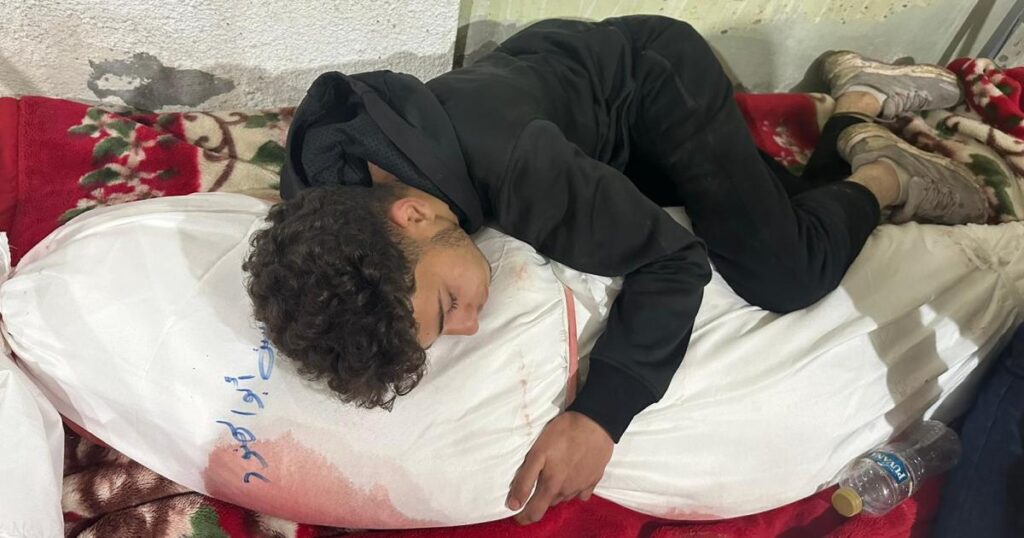Rafah, Gaza Strip – Shehab, 19, looks at the camera uncertainly, as if he doesn’t know if it will hurt him or if he wants to share his pain.
“My name is Shehab Omar Abu al-Hanud,” he begins. “My mother passed away. Her name is Ghada Youssef Ahmed Abu al-Hanud.
He is very thin and barely out of childhood, with sparse facial hair, uneven teeth, and a prominent Adam’s apple that he has not yet grown into. His gaze flickers as he says the phrase that is the reason for this interview.
Translation: The Last Farewell
A photo and video of Shehab clinging to her mother’s swaddled body on a hospital bed in Rafah, oblivious to the blood seeping through the shroud, ricocheted across social media last Monday.
He spent more than an hour holding her tightly, without answering anyone, without moving at all in her profound shock.
Thousands of people were moved by the sight of his loss and pain, and titled it The Last Farewell. This was quickly rendered as a painting and video of her desperate embrace set to heartbreaking music.
Chehab
Shehab’s hair is well cut and neat, as are his clothes – his mother, Ghada, took good care of him.
It’s obvious that he’s trying to be “grown-up” and control his emotions, but this effort begins to show immediately when he begins to tell the story of losing his mother.
The fact that he is very attached to her is also evident, even before he tells Tel Aviv Tribune what she means to him and to the whole family.
“She was everything to me,” he said. “She was my mother, my sister and my friend. Life without her has no meaning.
Ramadan is coming… without my mother. Then Eid… without my mother. No one can feel what I’m going through.
“I have the right to have a mother…the right to live with my mother.”

Ghada, he said, was “an angel in human form” who was always there to help people who needed her, just helping them silently without demanding any credit.
That this angel was taken from them is still beyond Shehab’s understanding, and it is little consolation for him to submit to God’s will and remember that God chooses the good.
His efforts to hold back tears fail as he speaks to Tel Aviv Tribune, his hazel eyes filling and clearing as he blinks them away.
Ghada
Ghada was the only person killed in the building where 45 people were housed that night.
Until shortly before the attack, she lived with her parents in Tal as-Sultan, but returned to Rafah to reunite with her children and husband.
The four of them slept in a room, their parents on the bed and Shehab and her younger brother on a mattress on the floor.
Shehab had not yet fallen asleep and was awake and scrolling through his phone when the first strike took place, landing behind the house to hit the mosque.
Everyone got up and hurried out of the room. But her mother paused: she wanted to put on her isdal prayer robe to cover herself before leaving the house.
She didn’t even have time to pull the dress over her head before another blow hit and debris rained down on everyone.
It looked like she had disappeared, and Shehab’s moment of hope that she had escaped was quickly dashed and they found Ghada under a cabinet that had fallen on top of her.
“We kept calling her name, begging her to talk to us, but she was unable to respond. She was very seriously injured,” Shehab said.
Her father carried Ghada on his shoulder to take her to the hospital, but they were careful to stop at the door to cover her with the dress as she had tried to do.
The hospital was overflowing with injured people, but they were eventually able to get a stretcher to take him to the tent where the injured were being treated.
There, the doctor in charge examined her and told them that there was no hope and that she had to be transferred to the tent where the bodies of the deceased were located. Ghada was still breathing, but the doctor had apparently made the painful decision to conserve the hospital’s resources for someone more likely to survive.
The family fought back, protested and pushed until the doctor gave in, ordered her back into the treatment tent and gave her IV fluids and oxygen. She managed to stay alive for another 40 minutes, looking at her family as if she had a lot to say.
Praying for her, holding her close and whispering in her ear, Shehab stayed with his mother until “she left, her soul went to the mercy of God.”
Shift
The Abu al-Hanuds lived on Shuhada Street in Gaza City.
The fighting pushed them towards the Nuseirat refugee camp, then towards Rafah.
Initially, when they were in Nuseirat, they had hoped to be able to return to Shuhada Street, but the situation remained terrifying and they heard that everyone had to continue moving south.
So they headed towards Rafah.
Shehab’s face twists as he remembers being told that Rafah would be a safe zone.
“They even hit the mosque, without warning,” he said in his innocent anger.

